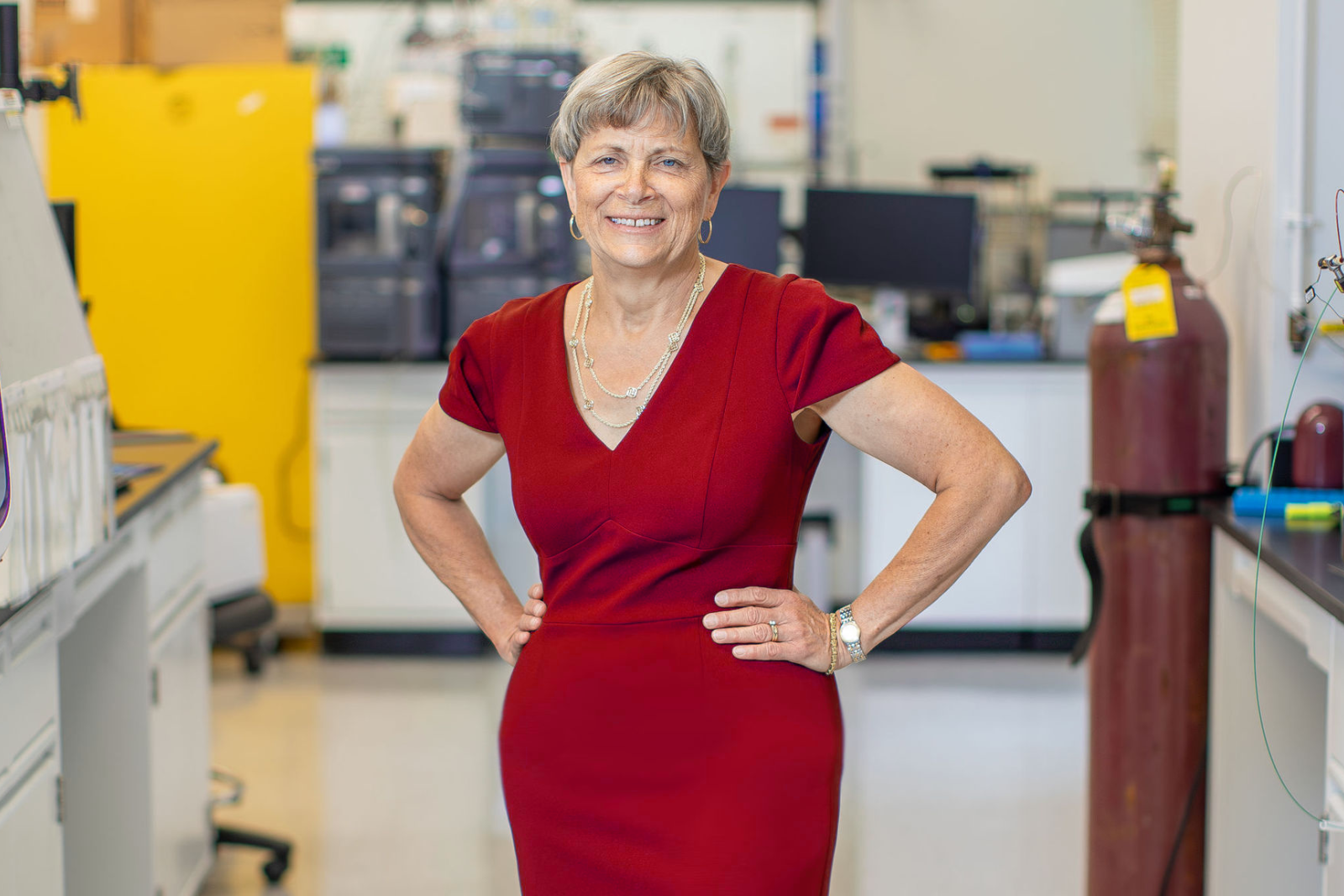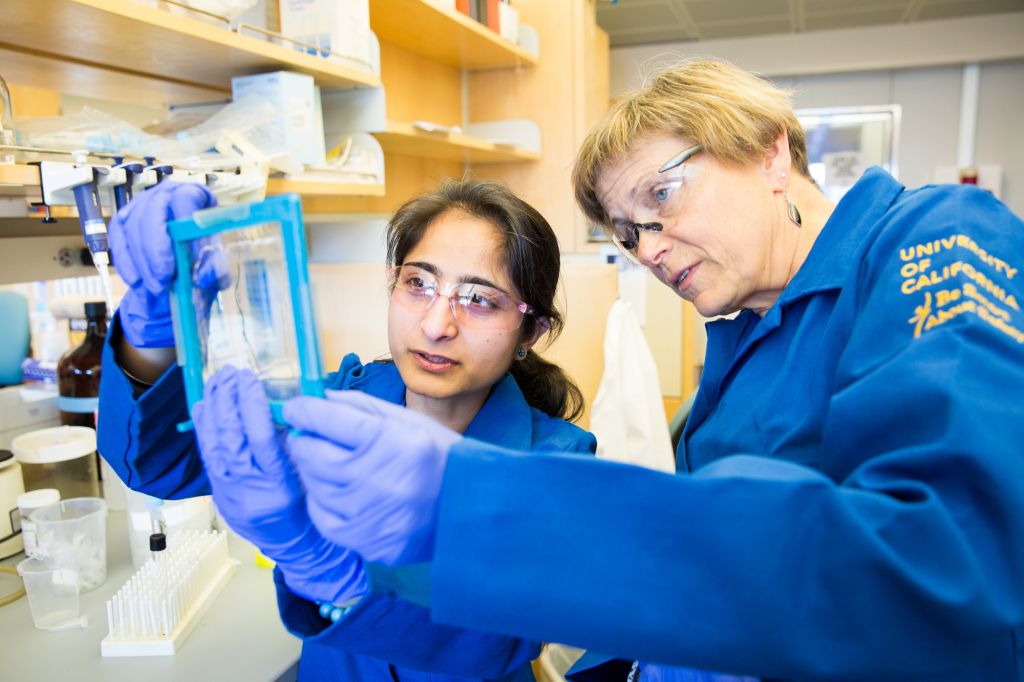Investigating unsolved problems through science: Looking at genetic variability and its effect on drug response

The idea of solving a complex challenge or making a discovery drew Deanna L. Kroetz, PhD, BS Pharm, dean and professor at The Ohio State University College of Pharmacy, toward a career in academic research.

I love the idea that when we don’t know something, you can help discover it. That’s what drew me toward research – being curious and realizing that you can chip away at the unknown to get pieces of information that can be combined to get new understanding.
Dean Kroetz had a passion for math and science in high school, which led her to Ohio State to pursue a Bachelor of Science in Pharmacy (BS Pharm) as a way to ‘dip her feet’ into one of the health sciences. The program introduced Dean Kroetz to academic research.
“The research pathway in the BS Pharm program at Ohio State was the first time I realized that I could have a career in research, and Dr. Dick Reuning influenced my interest in pharmacokinetics,” Dean Kroetz said. “That sent me to graduate school.”
After graduating from Ohio State, Dean Kroetz continued her academic career studying drug metabolism and pharmacokinetics at the University of Washington. She was interested in understanding why there is so much variation in drug response. One of the first projects that Dean Kroetz worked on as a graduate student related to genetics was studying variability in epoxide hydrolase enzymes and its elimination of the anticonvulsant carbamazepine.
“It was before modern human genetics, so all you could do was measure the enzyme activity and see variation in that – one source of that variation could be genetics,” Dean Kroetz said. “But at the time, it was very hard to investigate genetics as we do today, because the tools didn’t exist.”
Advances in human genetics – like being able to genotype everyone to see where genetic variation occurs – allowed scientists to associate some genetic variants with certain phenotypes. Large multi-investigator projects led to the accumulation of publicly available data that allows you to predict whether a specific genetic variant will have a biological effect. With these resources, scientists could now identify what gene that genetic variant is associated with or if the variant affects the expression of a gene or protein – which allowed you to understand what the association means. With all the single cell and sequencing technologies out there, scientists could get more information and relate it to a very specific activity in a single cell.
“Genetics is a great tool for discovery and for understanding mechanisms. Hopefully, this will translate into personalized medicine,” Dean Kroetz said. “You can often find genetic mutations in tumors, for example, but the question is, ‘Do we have a drug that can target that?’ and often times we don’t. Cataloging germline genetic variation in a lot of people allows us to link this variation to a disease phenotype, which translates into new pathways that can be targeted by drugs.”
 Dr. Kroetz said a great example of identifying a new drug target from human genetic discoveries is PCSK9 drugs. Studies have shown that people with naturally high activity of the cholesterol metabolizing enzyme PCSK9 due to rare genetic variants are more likely to have high cholesterol. Conversely, more common genetic variation leading to a reduction in PSCK9 activity was associated with lower cholesterol levels, suggesting that PCSK9 might be a novel target for treating hypercholesterolemia. Now, there are PCSK9 inhibitors that patients can take to lower their cholesterol.
Dr. Kroetz said a great example of identifying a new drug target from human genetic discoveries is PCSK9 drugs. Studies have shown that people with naturally high activity of the cholesterol metabolizing enzyme PCSK9 due to rare genetic variants are more likely to have high cholesterol. Conversely, more common genetic variation leading to a reduction in PSCK9 activity was associated with lower cholesterol levels, suggesting that PCSK9 might be a novel target for treating hypercholesterolemia. Now, there are PCSK9 inhibitors that patients can take to lower their cholesterol.
However, these discoveries don’t often happen quickly.
“This work can be slow and often, when I’ve trained students who don’t end up liking bench science, it’s been because the pace of discovery and rewards is too slow,” Dean Kroetz said. “We do get a lot of failure in science – because if we knew, we wouldn’t be doing the experiment. So, you must have the mindset that failure is okay, it starts you down the path to finding a new way to look at the problem.”
Even when you get a reward in the sense that your hypothesis proved true, you really don’t get to the answer – it just opens another door to explore.
“As a scientist, there’s always something else you don’t know,” Dr. Kroetz said. “When you find an answer, you get excited, but then you realize there’s more to do.”
As dean of Ohio State’s College of Pharmacy, Dr. Kroetz balances her academic and leadership responsibilities with her continued research around breast cancer, specifically in genetic differences in chemotherapy-induced peripheral neuropathy.
She began this research after networking with doctors and providers and hearing about the clinical problem facing breast cancer patients – that many patients were experiencing harm due to the drugs that were saving their lives. Dean Kroetz set out to find a way to reduce the negative side effects.
“If you don’t understand the mechanism for a problem, you can’t do anything about it,” she said. “Translational studies are rooted in the problems that patients have, so as scientists, we must have connections to doctors and other clinicians to understand what issues are out there. Then, we have to work on interdisciplinary teams to address them. That’s where we can solve these problems in novel ways.”
Looking ahead, Dean Kroetz sees the availability of human data from clinical and translational studies leading us to understand disease better and identify new drug targets faster.
“There’s a good chance that we will better understand the origin and biomarkers of disease relatively soon,” she said. “There is so much available data and powerful computational tools that will enable us to truly push the limits of drug design and development. And that’s how we can solve puzzles that make a difference in our patients’ lives.”